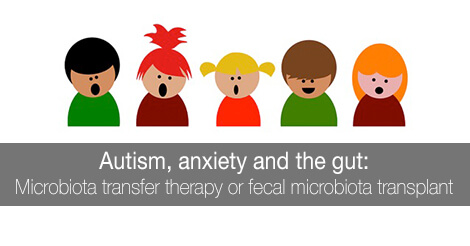
We know that one of your greatest ally in health is your microbiome – the trillions of bacteria that are the control center of your health! But sometimes your microbiome can actually cause problems. One way to improve the microbiome is via microbiota transfer therapy (MTT), also called fecal microbiota transplant (FMT).
I was recently interviewed by Dr. Raphael Kellman for the Microbiome Medicine Summit 2 (it starts May 8) and shared newly published research on this approach – Microbiota Transfer Therapy alters gut ecosystem and improves gastrointestinal and autism symptoms: an open-label study
Here are some of the details of this very promising research:
- It was a small study on children 6 to 7 years old
- They were given antibiotics for 2 weeks
- They were given a bowel cleanse
- They were given an extended fecal microbiota transplant. This was a high initial dose followed by daily and lower maintenance doses for 7–8 weeks.
- By the end of treatment and 80% reduction of gastrointestinal symptoms were seen. This included: constipation, diarrhea, indigestion, and abdominal pain.
- These gastrointestinal symptoms improvements persisted for 8 weeks after treatment.
- They also saw behavioral autism spectrum disorder symptoms improve significantly and remain improved 8 weeks after treatment ended. These symptoms included irritability, hyperactivity, lethargy and socialization
During the interview Dr. Kellman asked what bacterial changes were observed and I didn’t have the study on hand. I looked it up after the interview and this is what they report
Specifically, overall bacterial diversity and the abundance of Bifidobacterium, Prevotella, and Desulfovibrio among other taxa increased following MTT, and these changes persisted after treatment stopped (followed for 8 weeks).
Also
following MTT, the relative abundance of Bifidobacterium significantly increased fourfold and became comparable to its relative abundance in neurotypical children
They conclude that the MTT
shifted gut microbiota of children with ASD toward that of neurotypical children … consistent with the hypothesis that gut microbiota may be at least partially responsible for GI and ASD symptoms
Research just published last month reports similar results with digestive issues and anxiety. Germ-free mice were given the fecal microbiota from healthy control individuals or IBS patients with diarrhea, with or without anxiety. They found that the microbiota profiles in the mice matched the microbiota profiles of the human donors, affecting their digestive function and anxiety levels! I’ll share more on this study in a future blog post.
I hope you’ll join us on the Microbiome Medicine Summit 2, May 8-15, 2017 to learn more
Your host, Dr. Raphael Kellman, has seen the profound healing power of microbiome medicine and how it can address many diseases.
Learn the lessons and methodologies of microbiome medicine – it could improve your health, longevity, vitality and assist with unresolved problems!
It can enhance your brain function, improve mood, reduce anxiety and depression; and address gastrointestinal illnesses, including IBS, Crohn’s and colitis; counter newly identified GI/brain syndromes; and address autism and autoimmune diseases at the root cause!
I thoroughly enjoyed my interview with Dr. Kellman and look forward to hearing all the other great interviews. You can find details and registration here
I hope you can join us!

FMT’s are a great idea for many people, including Autistic kids but will only give temporary relief for many unfortunately when they still have too much Mercury in their system like Autistic kids do, they need to chelate first, then later some will benefit from FMT (some won’t even need it once the Mercury that is continually damaging their Gut is gone).
Jason
I agree, mercury plays havoc in many areas of the body so I can see this as a possibility. I’m curious if you’re aware of any research that discusses the fact that FMT is only temporary when mercury toxicity is an issue and how long the temporary benefits are typically seen? Or is this based on clinical results?
In this group, GI and behavioral improvements persisted for 8 weeks after treatment. It would be interesting to find out how many continued to do well after the 8 weeks.
I do know that mercury toxicity is front and center in the autism community so it’s likely that these study participants had already gone through a mercury detox protocol. They don’t mention this in the study but it would be helpful to know.
Hi Trudy-
In your opinion, what is a good protocol for a mercury detox? Also, do you know of any clinical research going on regarding the microbiome that one could apply to participate in?
John
Mercury detox is controversial and best done with a functional medicine practitioner well versed in this area.
I’m not aware of current microbiome clinical research
Hi Trudy
Thankyou for the article. A while ago I had a CDSA and my stool sample had an overgrowth of prevotella including other SIBO bacteria. At the time Professore Henry Butt stated that prevotella was a bad anaerobic species, particularly not good for the liver. Not sure why you stated they were beneficial?
Shannon
Here is a good article on prevotella: “The predominant genera in the human colonic microbiota are Bacteroides and Prevotella, which belong to the major phyla Bacteroidetes. Their composition and metabolic activities are largely modulated by diet and, in addition, they can also affect the metabolism of food. Prevotella is associated with plant-rich diets (high levels of complex carbohydrates and fruit and vegetable intake), whereas Bacteroides is linked to a high intake of fat and protein.” The authors state it has also been linked to inflammation and is “therefore relevant to consider context as an important factor when assessing the effects of Prevotella on host health” and more research is needed. http://www.gutmicrobiotaforhealth.com/en/the-latest-advances-regarding-the-link-between-prevotella-genus-diet-and-its-impact-on-host-health/
I’m curious about your diet at the time – was it primarily plant-based? And did you suffer from any inflammation?
Here is a good new scientific review on the link between gut microbiota and autism: http://healthandscienceportal.blogspot.com/2017/05/gut-microbiota-and-autism-what-is.html
Thank you for sharing